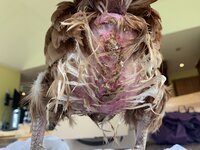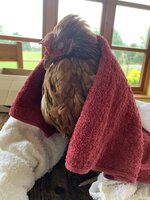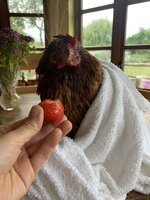One of my ex-battery hens has been unwell for more than a week now and I think her days are numbered, but I would like to save her if I can.
She was looking a little under the weather last week so I separated her for a bit of TLC. I noticed then that she was riddled with lice and mites, including lots of lice eggs around her back end. I feel awful about it - I have been treating the coop and the chickens for parasites but clearly failed. I immediately treated her with a mite powder (not DE) and kept her separate with good food etc. She has not seemed keen to drink at all lately but was eating, but very hunched up with a messy back-end.
I didn’t feel that the powder was very effective so I sprayed her with a permethrin solution (for birds) and also did the rest of the flock. I dismantled the bits of the coop that I can, burned the perches and some other old wood parts, sprayed everything with new mite killer and powdered the floors. The hen, Frida, seemed to perk up a bit over the next day or two so I let her in with the others - they didn’t seem to bother her and she seems to eat better with her friends. One other hen also showing similar symptoms at this point.
Essentially I assumed the problems stemmed from the infestation which is why I haven’t done more sooner. Frida and the other hen have stayed pretty much the same for several days now, not getting better or worse. They are fussy about food but yesterday they ate a lot of raw liver with some avian probiotics and some scrambled egg. Frida has been sleeping on the floor instead of the perch with her friends. The two hens are puffed up and hunched, slow to move, slow to eat and spend most of their time stood with their eyes shut.
This morning my mum saw our rooster mount Frida (which I have actually never seen him do I don’t think) so I immediately separated both the poorly girls again this morning. Frida’s back end was really gross and she would only eat one tiny piece of liver, although she did pick at some layers pellets. The other hen, whilst still hunched and slow, is eating and does seem alert with a bright comb.
This afternoon I decided to take more drastic action, wondering if Frida may actually be egg bound. She has soaked in a warm bath and I can feel no egg stuck. There are still lice eggs around her vent and a sort of scabby patch, neither of which will come away (I cut away some of the feather with eggs on). She is currently here in the house in a towel and looking pretty ropey, although she has eaten half a strawberry and I forced her to have a few drops of water and some ‘poultry drops’ I bought. She opens her eyes every five mins or so and eat a bit of strawberry and goes back to sleep... I know that’s probably not the best thing to feed her but she is not interested in much else.
Is there anything else I can do to help her? I’m sorry for the length. Pics attached showing the lice eggs and scabbed backside.
Oh, I should also note that there are STILL mites on her face sometimes. She has been sprayed twice and I can’t find them anywhere else on her body. I have put a bit of Vaseline on her face to stop them crawling on her eyes which was upsetting her and I have ordered some ivermectin.



She was looking a little under the weather last week so I separated her for a bit of TLC. I noticed then that she was riddled with lice and mites, including lots of lice eggs around her back end. I feel awful about it - I have been treating the coop and the chickens for parasites but clearly failed. I immediately treated her with a mite powder (not DE) and kept her separate with good food etc. She has not seemed keen to drink at all lately but was eating, but very hunched up with a messy back-end.
I didn’t feel that the powder was very effective so I sprayed her with a permethrin solution (for birds) and also did the rest of the flock. I dismantled the bits of the coop that I can, burned the perches and some other old wood parts, sprayed everything with new mite killer and powdered the floors. The hen, Frida, seemed to perk up a bit over the next day or two so I let her in with the others - they didn’t seem to bother her and she seems to eat better with her friends. One other hen also showing similar symptoms at this point.
Essentially I assumed the problems stemmed from the infestation which is why I haven’t done more sooner. Frida and the other hen have stayed pretty much the same for several days now, not getting better or worse. They are fussy about food but yesterday they ate a lot of raw liver with some avian probiotics and some scrambled egg. Frida has been sleeping on the floor instead of the perch with her friends. The two hens are puffed up and hunched, slow to move, slow to eat and spend most of their time stood with their eyes shut.
This morning my mum saw our rooster mount Frida (which I have actually never seen him do I don’t think) so I immediately separated both the poorly girls again this morning. Frida’s back end was really gross and she would only eat one tiny piece of liver, although she did pick at some layers pellets. The other hen, whilst still hunched and slow, is eating and does seem alert with a bright comb.
This afternoon I decided to take more drastic action, wondering if Frida may actually be egg bound. She has soaked in a warm bath and I can feel no egg stuck. There are still lice eggs around her vent and a sort of scabby patch, neither of which will come away (I cut away some of the feather with eggs on). She is currently here in the house in a towel and looking pretty ropey, although she has eaten half a strawberry and I forced her to have a few drops of water and some ‘poultry drops’ I bought. She opens her eyes every five mins or so and eat a bit of strawberry and goes back to sleep... I know that’s probably not the best thing to feed her but she is not interested in much else.
Is there anything else I can do to help her? I’m sorry for the length. Pics attached showing the lice eggs and scabbed backside.
Oh, I should also note that there are STILL mites on her face sometimes. She has been sprayed twice and I can’t find them anywhere else on her body. I have put a bit of Vaseline on her face to stop them crawling on her eyes which was upsetting her and I have ordered some ivermectin.








